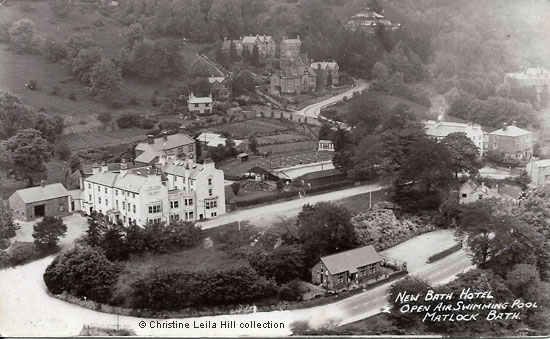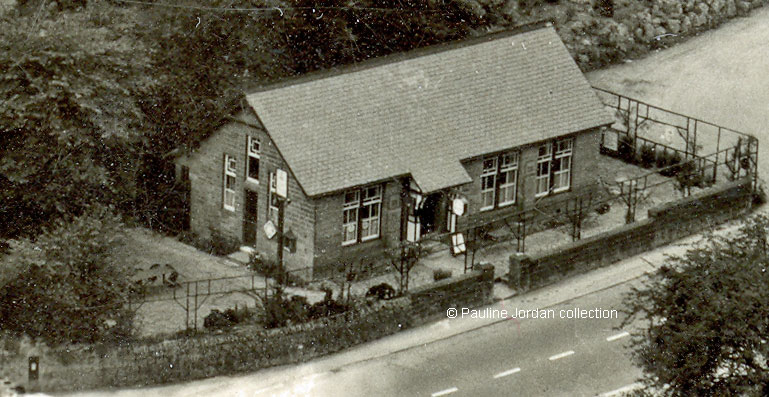|
Images Index> Matlock Bath, 20th and 21st Century Images> This page |
| Matlock Bath: New Bath Hotel (5) |
| Matlock Bath : Twentieth Century Photographs, Postcards, Engravings & Etchings |
|
|
|||||||||||||||||
The pool replaced the large and very old lime tree there had been in the hotel's gardens, although was not quite in the same place as the lime had been[2]. The photograph dates from the early 1930s, whether or not it was taken to advertise the new swimming pool, as Win Tor, to the right of the New Bath's Roadhouse on Derby Road, looks both neglected and unoccupied. It was possibly being demolished. Win Tor is shown in a similar state on the previous image, suggesting the two pictures date from around the same time.
On the very top edge, about a quarter of the way along from the left, is what appears to be a small white mark. This is the entrance to the Cumberland Cavern and the small building is the hut that stood near the cavern's entrance. Cyril Edmonds, who owned the cavern, had originally provided a pavilion for the cricket field that was up the lane above the Cavern, and when it was no longer needed he took it down and rebuilt it at the cavern. It had central wooden steps up to a roofed verandah and double doors into the hut - definitely a pavilion style[3].
|
||||||||||||||||||
There is more about the New Bath Hotel
|
||||||||||||||||||
1. and 3. "New Bath Hotel, Open Air Swimming Pool. Matlock Bath". Postcard in the collection of and provided by and © Pauline Jordan. Posted 8 Jul 1947 in Matlock, Derbyshire. Personal family card written at Dovedale House. 2. "New Bath Hotel, Open Air Swimming Pool. Matlock Bath". Postcard in the collection of and provided by and © Christine Leila Hill. There is no publisher's name on either card. Researched by and © Ann Andrews. Intended for personal use only |
||||||||||||||||||
References (coloured links are to more information elsewhere on this web site): [1] See Matlock Bath: Warm Walls Toll Bar, before 1879. [2] See image 6 on the "Just Images" of Matlock Bath page. The ancient lime tree is also mentioned by Henry Moore in his guide Picturesque Excursions From Derby to Matlock Bath (1818). [3] From information provided by Christine Leila Hill, whose grandfather owned the cavern. [4] "Derbyshire Times", 23 August 1930. [5] "Derbyshire
Courier",3 September 1881.
Matlock. Annual Brewster Sessions. Removal of Licence. |
||||||||||||||||||



















